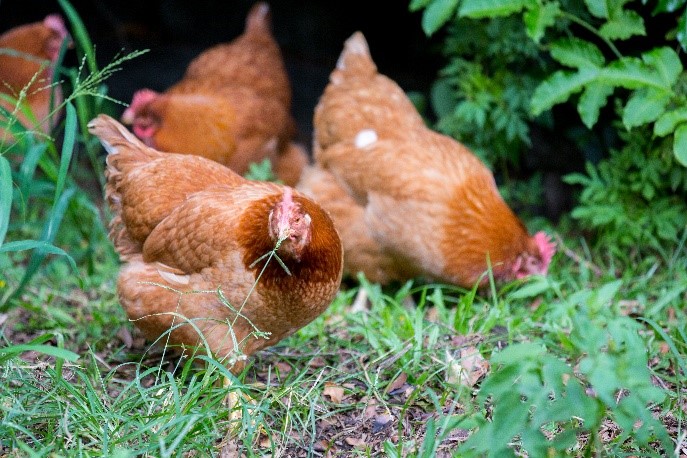
Whether your chickens are pets or kept for food (e.g., for eggs), they all require a healthy diet to maintain their health in different life stages — growth, moulting, laying etc., — all of which place different strains and stresses on their bodies.
There are a few things to consider when we talk about feeding chickens. The good thing is that, of all the species of birds in the world, chickens are the only ones for which we know the exact nutritional requirements. Millions of dollars have been spent researching and understanding diets for our chickens. It would be a folly not to take advantage of that information and feed our chickens the best possible diet.
The nutrient requirements of poultry are affected by many factors, including:
- The species of the bird: Chickens are chickens – they are not turkeys or ducks or geese. They need chicken food – not turkey, duck, or goose feed!
- Age: Typically, chickens are fed a starter diet (up to six weeks of age), then a grower diet (from 6-18 weeks of age), followed by a layer diet (from 18 weeks of age). Some companies are now producing a maintenance diet for roosters and mature hens who are not laying.
- Sex and reproductive state: Prior to sexual maturity (3-6 months), roosters and hens can usually be fed the same diet. Following the onset of sexual maturity, there are significant differences in nutrient requirements and so different diets are required for each sex.
- Housing system – the type of housing system will influence the level of activity of the birds and, therefore, their energy requirements.
- Health status – birds experiencing a disease challenge may benefit from an increase in the intake of some nutrients, most commonly vitamins.
Domestic poultry are omnivores; they cannot rely on a total grain diet, and their digestive system is not developed for handling leafy material such as grasses. Whole grain wheat is deficient for poultry in protein, calcium, and vitamins, especially vitamin A, and the phosphorus content can vary widely.
Therefore, the basis of a poultry diet should be a good quality commercial feed. Modern commercial poultry feeds in Australia are pelleted (compressed into thin cylinders and cut to appropriate lengths and shapes). They are usually wheat/sorghum-based, with a significant component of ruminant derived meat and bone meal (unless for vegetarian egg production) and some plant derived protein rich materials (soy-bean meal, canola meal etc.), supplemented with vitamins and minerals.
Starter diets are fed to chicks up to six weeks of age. These diets are usually small pellets and are higher in protein and energy to allow for a rapid growth at this age. Many chick starters are medicated with a class of drugs that prevent coccidiosis (an intestinal parasite infection).
After six weeks of age, the chicks are transitioned to a grower diet for the next three months. This diet is lower in protein but has the same amount of energy as the starter diet.
From 18 weeks of age, hens are fed a layer diet with higher protein and calcium to cater for the demands of egg production.
A note about feed additives
Additives are primarily added to diets to improve the efficiency of the bird’s growth and/or laying capacity, prevent disease, and improve feed utilisation. Hormones have not been used in poultry feed in Australia since 1963. Growth-promoting antibiotics (often referred to as ‘growth hormones’) were phased out in Australia in 2005. Any additives used in feed must be approved for use and then used as directed with respect to inclusion levels and duration of feeding.
Commonly used additives include drugs to combat intestinal parasites (medicated chick starter), prebiotics and probiotics, enzymes, antioxidants, and feed acidifiers. Claims that commercial feeds are full of hormones and antibiotics are well out of date.
What foods are available?
There are different types of feed sold for poultry:
- Mash: a nutritionally complete feed in a ground form. It is often used as a starter ration.
- Pellet: a mash that has been pelletised; that is, compressed and molded into pellets in a pellet mill. Unlike mash, where the ingredients can separate in shipment and the poultry can pick and choose among the ingredients, the ingredients in a single pellet stay together, and the poultry eat the pellets whole. Pellets are often too large for newly hatched poultry.
- Crumble: pellets that have been sent through rollers to break them into granules. This is often used for chick feed.
- Scratch: one or more varieties of whole, cracked, or rolled grains. Unlike other feeds, which are fed in troughs, hoppers, or tube feeders, scratch grains are often scattered on the ground. Hence, a large particle size is desired. Because they consist only of grains, scratch grains are not a complete ration, and are used to supplement the balanced ration.
- Medicated feeds: Many commercial starter diets are medicated (see above). Care must be taken to ensure that these feeds are not fed to species other than chickens, as these drugs can be toxic to turkeys and peafowl.
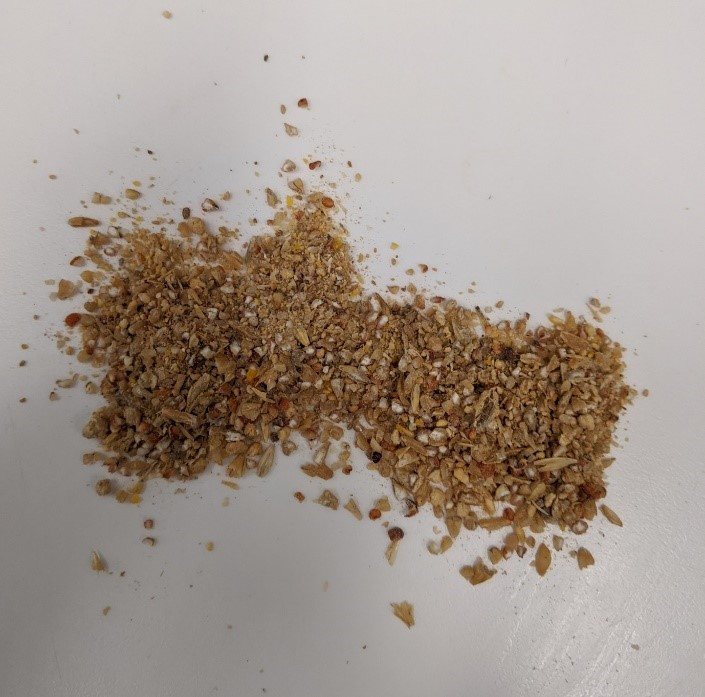
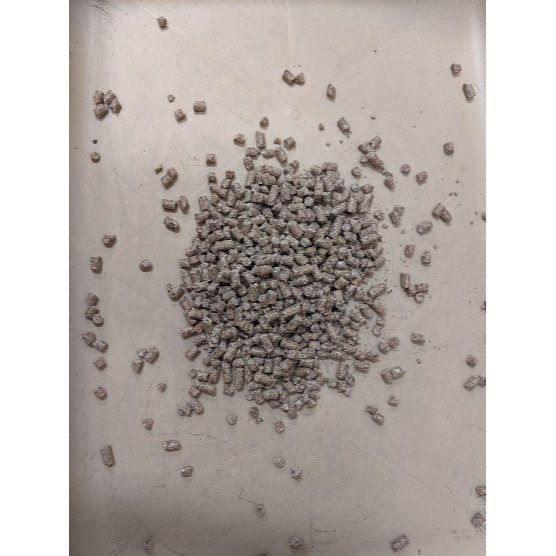
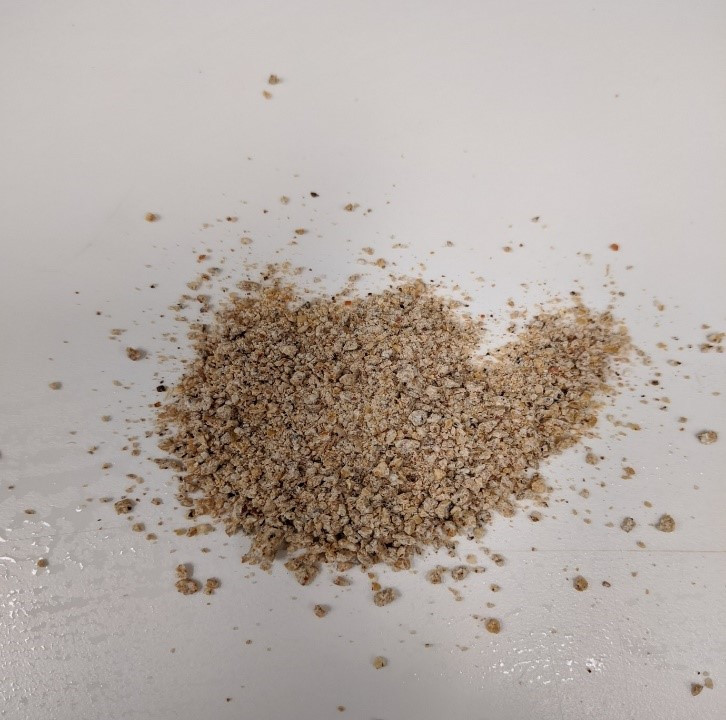
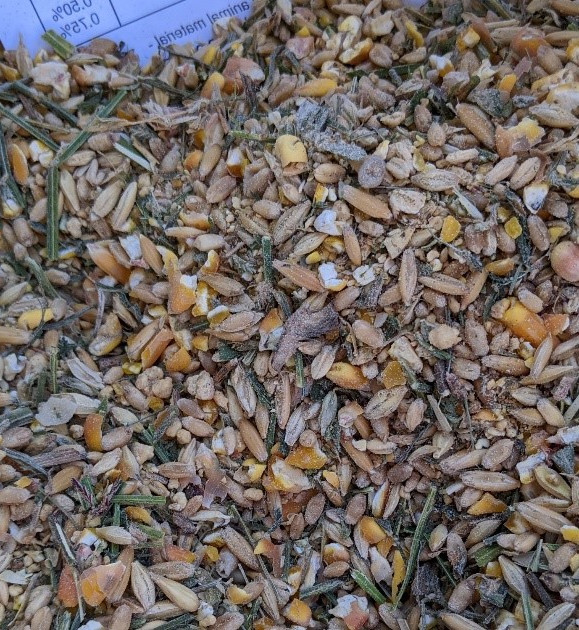
Chickens can also be fed table scraps, such as vegetable kitchen scraps and garden plants. Some poultry keepers also provide mealworms as a treat. These scraps should not exceed 10% of daily feed consumption, or there is a risk of creating a nutritional imbalance. For more information on what foods should be avoided, see this article.
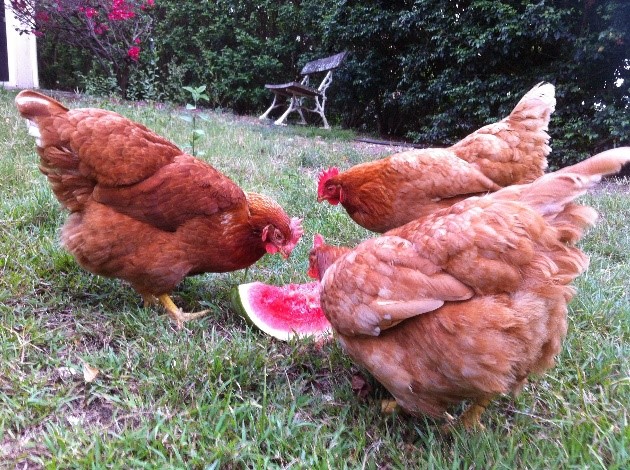
Grit is helpful for both digestion (insoluble grit) and a source of calcium for layers (soluble grit).
Putting it together
Feed for backyard and fancy breed poultry should be predominantly (~90%) a commercial-prepared balanced pelleted diet, which can then be supplemented (~10% of daily intake) with kitchen vegetable scraps, whole scratch grain, garden foraging, etc.
Water and feed consumption
Food and water should be provided in easily cleaned containers, with sufficient space (approximately 10cm/bird) so that all the chickens can eat or drink at the same time. The containers should not easily be tipped over, not easily soiled, multiple containers should be provided (just in case one is knocked over/soiled/broken).
On average, adult chickens will drink 400ml of water per day. Hens in lay may drink up to 25% more than those not in lay. Water and food consumption rates are interdependent, so reduced water intake can also lead to reduced food intake. There are other factors that affect water intake, with temperature being the most obvious one. For example, chickens drink between 30-50% more water when the environmental temperature is above 32°C compared with when it is 21°C. Make sure that your chickens always have plenty of clean fresh water.
References
Greenacre C (2021) Backyard poultry nutrition. In: Greenacre C, Morishita T (eds) Backyard Poultry Medicine and Surgery: A Guide for Veterinary Practitioners. John Wiley & Sons, Inc, pp 117–130
Hodgkin H, Mackinson I (2019) Clinical examination and emergency treatment. In: BSAVA Manual of Backyard Poultry Medicine and Surgery. British Small Animal Veterinary Association, pp 39–44
